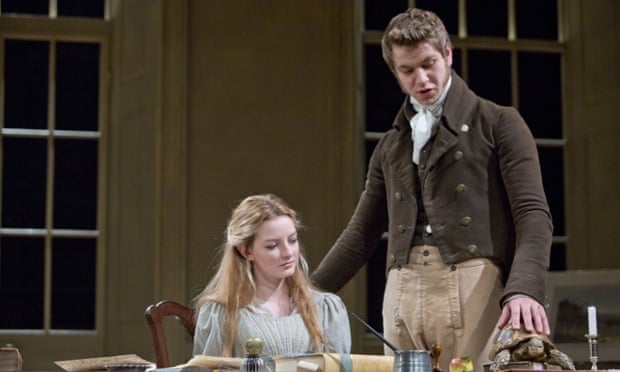 |
Saturday 28 February 2015
Othello, Shakespeare's Globe ****
Friday 27 February 2015
The 39 Steps, Criterion Theatre ***
 |
Monday 23 February 2015
Farinelli and the King, Sam Wannamaker Playhouse ****
 |
 |
Sunday 22 February 2015
The Mastersingers of Nuremburg, Colliseum *****
Saturday 21 February 2015
Arcadia, Churchill Theatre ***
 |
Wednesday 18 February 2015
The Book of Mormon, Prince of Wales Theatre *****
 |
I needn't have worried. The show is a magical romp and I loved every minute of it. From tap dancing Mormons to a book being placed somewhere quite uncomfortable, this show has well deserved it's 2 year residency at the Prince of Wales. It has not just relied on a readymade storyline from a film or real life event but has created a musical totally independent of any other medium. The creators of South Park, along with Robert Lopez, have created a simple story with clever and catchy melodies which pay homage to, but do not copy, the best musicals of all time with nods to Lion King, Singing in the Rain and Wicked to name but three. It has a dig at the Mormon church in a hilarious way but packs a serious message about the role of religion in modern day society. This is the third cast at the Prince of Wales but they are still so energetic, talented and fun, especially Nic Rouleau and Brian Sears as the Elders Price and Cunningham who, after performing in the show in the States, are brash and joyful in their leading roles. If you are in anyway easy to offend or find genitalia, expletives or blasphemy offensive, you should stay away but if not, you will have one of the best experiences you could ever have from commercial theatre.
Happy Days, Young Vic ***
 |
Tuesday 17 February 2015
Behind the Beautiful Forevers, National Theatre ***

This adaptation of Katherine Boo's novel by David Hare is yet another example of how Hytner has succeeded in creating a truly 'National' Theatre. Yes, this isn't the best work from the National and has flaws but attention needs to be shined on the example this institution has set in having a diverse programme in order to attract a diverse audiences without sticking with the safe bets which attract the easy audiences. To this, I salute the National for being a shining example for British theatre to follow.
However, I can't say that the play about Indian slums is particularly convincing. David Hare has created a sense, heavy play which is difficult to like in the same way as Dara does. This is not helped either by the enormity of the Olivier which needs a sensitive script to create connection between character and audience. Despite this, I still feel that it is a good show. It is promising to see Rufus Norris direct so well in his last production before taking up the position of Artistic Director here. Meera Syal leads a marvellous cast, many of whom are in rep and also performing in Dara at the Lyttellton. The set, also, is magnificently designed by Katrina Lindsay, managing to inhabit both a bustling, vast city to a cramped street of slums. There is plenty to be interested in and, with a little bit of work, this award winning book can be transformed into an award winning play.
Saturday 14 February 2015
Bull, Young Vic *****
 |
Friday 13 February 2015
A View from the Bridge, Wyndham's Theatre *****
 |
Saturday 7 February 2015
The Hard Problem, National Theatre ***
 |
| Olivia Vinall in The Hard Problem |
Sunday 1 February 2015
3 Winters, National Theatre ****
 |
Subscribe to:
Posts (Atom)